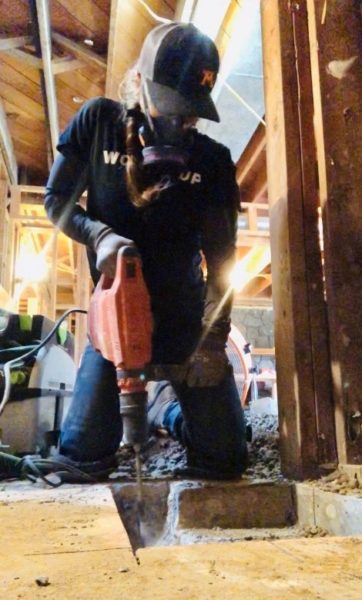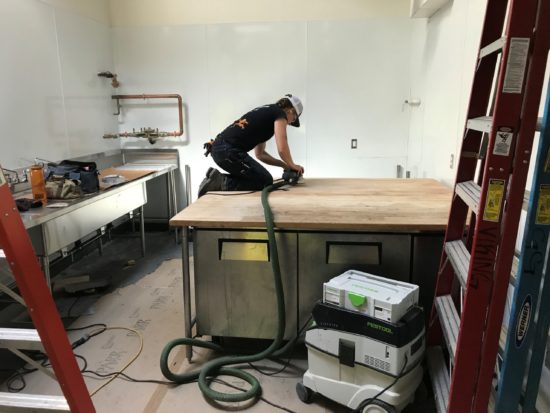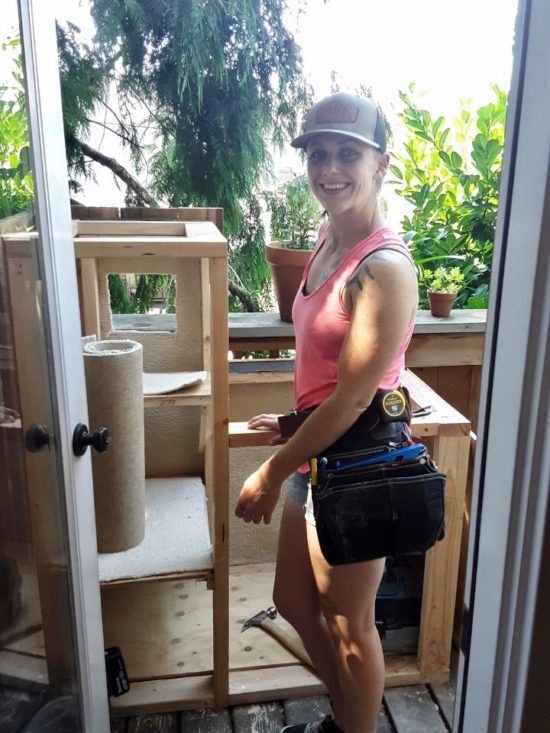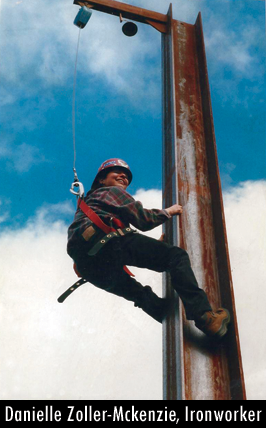Ironworker
Oregon Tradeswomen Graduate Ruby Fjeld

Ruby grew up in Boulder Colorado and has been around carpentry most of her life. Her Dad is a finish carpenter, but until recently, she never thought about it as an option for herself.
Ruby moved to Portland in 2010 for college – taking a year to establish residency. After more than 7 years in and out of college and working full time, being broke, and stressed out, Ruby came to a turning point.
She was working in the lumber department of Home Depot, the first woman to work there, and struggling to juggle the demands of a full time job and going to school full time and studying. One afternoon, a customer noticed Ruby’s hard work and hustle. The customer said, “Hey, you work really hard and we need people like you in the trades. My union sponsors this organization, Oregon Tradeswomen. You should check them out.”

Ruby looked into our programs and the timing was perfect. After applying and getting accepted into Oregon Tradeswomen’s Summer 2018 Trades and Apprenticeship Career Class (TACC), she was laid off from her job in the lumber yard, but pursued our training program anyway. “It was an incredible struggle at that time. I lost my health insurance, and my ability to access needed care and medication. I was in a dysfunctional housing situation, too. It was a really huge milestone for me to graduate. My whole family was there at graduation which was really meaningful for me, and the whole experience has truly been life changing.”
Wanting to go into the Ironworkers apprenticeship, Ruby put in her application and went to work at Vigor as a temporary employee. It wasn’t long before she heard back from the Ironworkers. She was accepted, went through orientation and started out as a rod buster. “It was the most incredibly difficult work I have ever done or will ever do.”
Ruby wasn’t sure this was a good fit for her, but she isn’t the type to just show up and quit, so she kept doing the hard work “More than 9 months into my apprenticeship, I was either carrying a heavy load on one shoulder or stooped over tying rod all day. When I realized this wasn’t going to be a long term fit for me, and that I needed a change, I started exploring residential carpentry.”
After doing some research, Ruby submitted a few applications with local companies, and in a couple of months, she got an offer. This was a turning point for Ruby in her career path. She was hired on by Green Gables Design and Restoration as a laborer two years ago. “I took a pay cut, but it was okay, because I knew it was the place I wanted to be. My first week with the company, I thought they were playing a trick on me because the people were so nice, respectful, and easy to work with. The culture was relaxed, friendly, and positive.” The teamwork oriented crew helped her feel excited to learn.
And learning is one of the things Ruby loves most about her career. “I love that I am constantly being asked by the work to use my brain and my body in creative ways. There is always something to learn, something new, even if I’m digging a hole, there some unexpected thing I learn. I also appreciate that this is viewed as an asset by the people I’m working with.”
When we asked Ruby to share something that would surprise us, she shared, “I am very business-like when I get to work, and in layers and rain gear, we all look the same. People are probably surprised when I take my gloves off. I like to paint my nails – I’m femme.”

When asked to reflect back on her time in the class, Ruby said:
“I have nothing but positive things to say about my experience! Oregon Tradeswomen allowed me to get out of the ‘poverty track’ – the jobs available to me where I could just barely scrape by. Graduating from OTW got me out of that cycle of living paycheck to paycheck. But it wasn’t easy! It was a hard class. OTW is not kidding around. It’s a serious program. But it paid off. It’s a stepping stone or a gateway to a different level of prosperity!”
Danielle Zoller-McKenzie: Iron in the Blood

Danielle Zoller-McKenzie has union Ironworking in her blood — she grew up with a dad, brother, cousins and uncles in the trade. But while her family didn’t discourage her from pursuing work in their field, she wasn’t exactly encouraged to try it, either. “They thought I was going to be too small,” she says.
But a summer job as a hodcarrier – or “hoddie”, as she was dubbed by the masons she worked with convinced her she was more than up to the task. “The camaraderie is what I really liked,” she told us. “My brother worked there too. To be a woman and a hard worker is a different kind of feeling than you get than just being a ‘woman worker.’ The praise you get from working really hard, it’s just a big deal.”
After graduating high school, she worked in the shipyards, confirming her love of working in the trades. She applied to the Ironworkers apprenticeship program, and after a year of waiting – somewhat impatiently, she adds — she was in the door.
“I knew when I got into this trade that it’s a man’s world,” Zoller-McKenzie says. She was treated differently by coworkers, held to a different standard. Everyone in the program could see the double standard, but she opted to focus all the more intently on her work in the face of adversity. “It’s always paid off for me to take the high road,” she says. “Although that may not be my first instinct.”
Zoller-McKenzie started her career back in 1998 working on bridges and rebar projects. After two years, she came to Carr Construction, and has worked for the same company ever since, drawing on an enduring network of supportive co-workers rather than surfing from job to job. She says she values security over novelty: “I’d rather wait out the slow times.”
In 2000 as an apprentice, she became eligible to start work on her welding certification and passed the initial training in only three weeks. She pressed on, getting incremental raises and working hard as a “grunt,” as she puts it. She passed her journeyman’s trade certification in 2002 and has since advanced to her current role as superintendent. Through the years she took a number of OSHA classes and is now starting to teach apprenticeship training classes herself.
“I got lucky as a female,” says Zoller-McKenzie. “Because I did make friends and they took me under their wing.” (Continuing in the tradition of paying it forward, she’d like aspiring Ironworkers to know there’s now a smart phone app to aide with the math-heavy art of angle finding. Yes, it’s called Angle Finder.)
Her work has afforded Zoller-McKenzie some memorable times. She’s had a one and a half day welding assignment turn into a gig that lasted over a year, and a job in Terrebonne, Oregon for which she got to do her work 150 feet off of the ground.
The job is not without its downsides – Zoller-McKenzie says the weight of working outside in all weather conditions is getting hard to bear as her body ages. And she says she’s had to sacrifice any semblance of a “normal” family life: “The crazy schedule of this job demands pretty much 15 hours a day.”
But she likes this work. Zoller-McKenzie’s career path has taken her from journey-level worker to crew supervisor — nowadays she also performs crew foreman duties as needed, delegating tasks and being responsible for safety compliance.
She’s proud of what she does. She makes good money and, as she tells us in our interview “the kind of fun you can have on a job is unbelievable.” Looking forward, she has plans to pursue her OSHA safety supervisor certification, and would love to work as an engineer for that agency one day.
This multi-generation Ironworker’s advice to new female tradeswomen? “There’s always going to be some guy who will blow you off because they don’t believe women should be in this job. Have a thick skin. Accept what is, and find the positives.”
